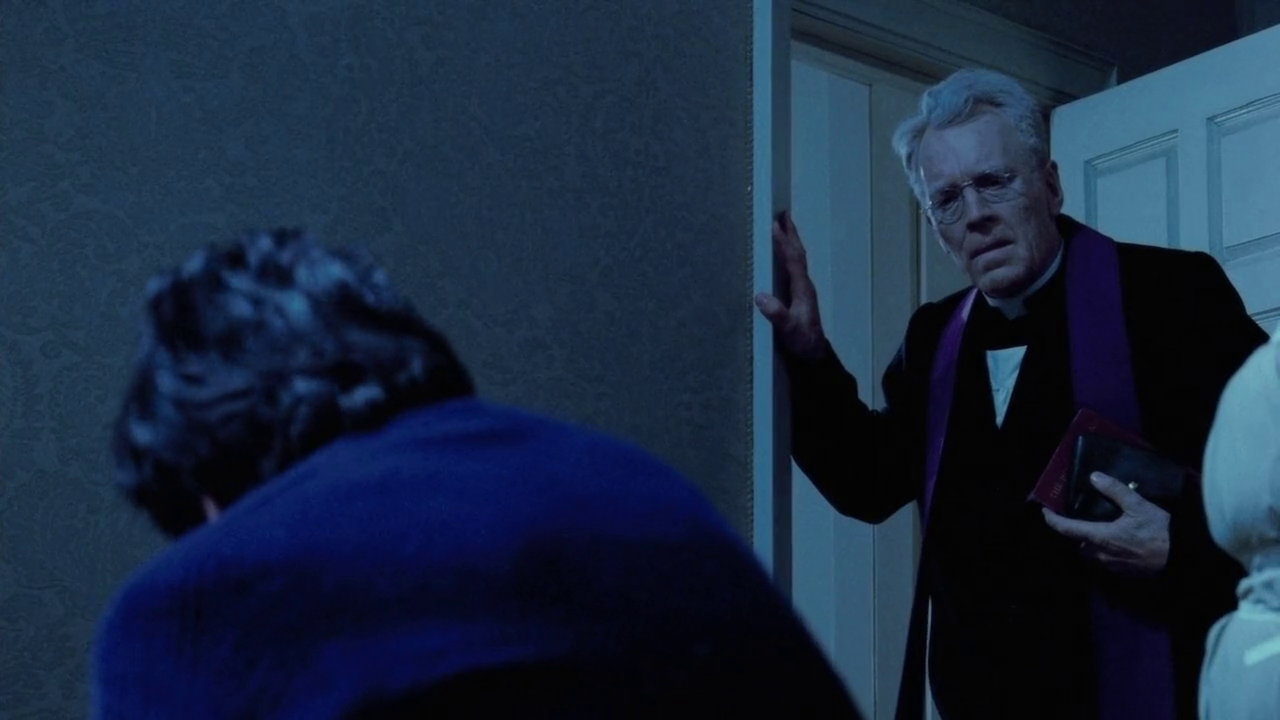by Jason Adams

"I think the point is to make us despair. To see ourselves as animal and ugly. To make us reject the possibility that God could love us."
Re-watching The Exorcist this weekend for the gazillionth time -- but for the first while under the Coronavirus quarantine here in New York -- was an interesting experiment. Like a lot of you I've been locked up in my apartment now for three days, just watching movies and binging TV shows and doing whatever I can to avoid looking at the news (or god forbid Twitter). But still it's proven impossible not to see each successive thing through the lens of now -- the characters in whatever I'm watching will go to a bar or hug and I will wince, thinking "Socially distance yourselves dammit!" before I can even catch myself.
One week ago (a lifetime in itself, at this point) Max von Sydow died and Nathaniel wrote up a lovely memorial and asked me if I'd like to switch up our "Great Moments in Horror Actressing" series for an actor who we loved like an actress, and one who did his fair share of time mucking about in the horror genre. Max had a face for dallying with Death, be it over a chess board or a little girl's bedside; as gaunt and serious as the grave, as a medieval plague etching, but also capable and strong enough to smile, knowingly, back at it. Max Von Sydow always looked like he knew things he wasn't telling us...
I'm not religious but watching The Exorcist under this dark cloud we find ourselves under today brought me the sort of comfort religion promises. Perhaps finding comfort in The Exorcist of all things sounds outrageous to you, but that's what the genre has always meant to me -- the shared catharsis of people facing down demons, whether they win or lose. The communion of that experience.

Paying close attention to Father Merrin this go-through turned out to be especially rewarding. Once we meet him in the film's prologue in Iraq he doesn't show up again until the last act, an icon in shadow against a Georgetown streetlamp, but he sweeps in like the counterweight we've been waiting for -- as the story of Regan MacNeil spirals out of control we think here, finally here at last is an equal and opposing force.
Max von Sydow, ghost pale and trembling, immediately undercuts our assumptions. This isn't even the weathered old man we met in the desert anymore -- cast in the blue purple light of Regan's icy bedroom he seems frail, wrinkled, as exposed as a vein, a heart slowing to its end. And yet Merrin musters something, stirs the place to hope, just enough hope to cross that horrible finish line.
We don't see what happens to Merrin, we're out of the room when he dies -- Father Karras comes back and he's already gone, kneeled over the side of the bed as if praying, his holy water spilled beside him as the demon sits staring from the foot of the bed. Karras assumes the demon killed him, although we in the audience have seen Merrin take medicine for his heart just before he went back into the bedroom, making us consider the alternative, that his heart simply gave out.
Whichever is the truth you are left wrestling with the feeling that this man has traveled thousands of miles and the span of his entire life to get here to this small bedroom in the upstairs of a movie actress' rented house to die on his knees before the task is still at hand and while we're out of the room. But that, in itself, the weight of that journey and the way that Max von Sydow imparts the weight of that journey becomes the point -- it gets Karras to do what needs to be done, and it tells us, the viewer, that we fight.
We dust ourselves off and we take the pill we need and we stand up and we go into the next room knowing what's there, whatever its horrors. Even if we know that's that, because that step, those steps, they might be the ones that the next person needed. They might be the steps, if honest and true and with decent purpose, that end up saving the day. Don't despair. You are loved. That's what I felt when I watched Max von Sydow, anyway.
